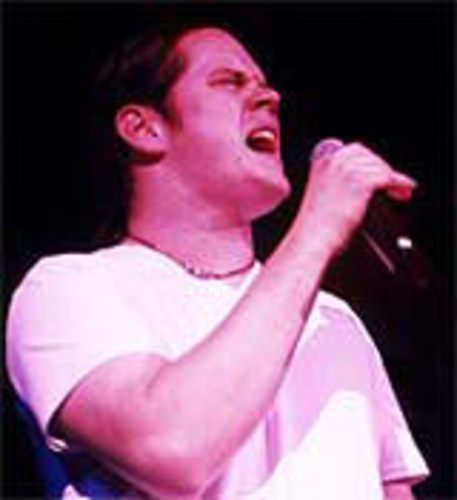1999 Commencement at Berklee: David Bowie and Wayne Shorter

Wayne Shorter (left) and David Bowie (right) meet students after the Commencement Concert.
Photo Bob Kramer

Photo Bob Kramer

Photo Bob Kramer

Photo Bob Kramer
The coming together of rocker David Bowie and jazz great Wayne Shorter as honorary doctorate recipients at Berklee's 1999 Commencement is not as unlikely a pairing as it might seem at first glance. Shorter has performed with pop artists like Joni Mitchell, the Rolling Stones, and Steely Dan, while Bowie can claim Pat Metheny as a composing partner and has taken a turn as a jazz balladeer, having recorded "A Foggy Day" for the Red, Hot + Rhapsody compilation. Both men are considered influential composers and both have been playing saxophone for decades. But what truly unifies Bowie and Shorter are their adventurous approaches to contemporary music and the reverence with which fans and fellow musicians view them.
That reverence was in full flower at the Commencement ceremony on May 8, when graduates and their guests cheered wildly as the two honorees were introduced at the Hynes Convention Center. Amongthe graduating seniors were several students who performed in the previous night's Commencement concert, a tribute to the music of Bowie and Shorter. "Wayne and myself were just so moved to hear our compositions coming back at us through your ears and abilities. It was dynamite," said Bowie at the beginning of his Commencement address.
Later Bowie told the crowd that the game of "What if?" is at the heart of his music-making approach. "What if you combined Brecht-Weill musical drama with rhythm and blues? What happens if you transplant the French chanson into the Philly sound? Will Schoenberg lie comfortably with Little Richard?" It was a fitting explanation for this audience, as diversity and experimentation in contemporary music have long been at the core of a Berklee music education.
Bowie's speech was filled with humorous anecdotes from the front lines of the industry and a laid-back affability that kept the audience smiling throughout the talk. He spoke of his long friendship with John Lennon and a strange encounter with Aretha Franklin, and he joked about an outstanding tuition payment owed by his guitarist and Berklee alumnus Reeves Gabrels '81.
Using a series of comic gestures he repeated throughout the speech, Bowie divided up the world of musicians at Berklee and elsewhere into three major factions: rockers, jazzers, and samplers. He accompanied the word "rockers" with some air guitar; mimicked the motion of a saxophonist while saying "jazzers;" and pointed fingers from the top of his head, antenna-like, when he referred to "samplers." It may have been Bowie's way of saying that Berklee provides an environment for many strains of contemporary music.
Musical categories notwithstanding, the 580 seniors walked away with diplomas representing a wide range of music professions, in majors including music production and engineering, music therapy, film scoring, music synthesis, jazz composition, and music business/management. The graduates hailed from 48 countries.
The student speaker at Commencement, South African Film Scoring major Marijke Van Niekerk, talked about the influence the graduating class could have on the world. "We have an important place in society as musicians," she said during her speech. "We are made to inspire and help others through our
music. . .we are to be the dream makers, the musers, and the givers of inspiration in the 21st century."
Students did their best to inspire the crowd of more than 1,200, including Shorter and Bowie, who watched the Commencement concert at the Berklee Performance Center on May 7. Two impressive jazz combos tackled Shorter compositions like "Footprints" and "Elegant People." An unusual arrangement of Shorter's "Ana Maria" featured Romanian student Damian Draghici on pan flute. Twelve student vocalists, accompanied by the Berklee Jazz-Rock Ensemble, took turns singing lead and background parts on several Bowie tunes, including "Changes," "Black Tie White Noise," and "Golden Years." The Berklee West African
Drum and Dance Ensemble surprised the audience by entering the hall from the rear and providing a rousing opening to Bowie hit "Let's Dance."
Berklee President Lee Eliot Berk bestowed honorary degrees, then addressed the graduates, praising their achievement and recognizing several who had overcome physical and political challenges to attain their goal of a music degree.
After receiving his honorary doctorate, Wayne Shorter described music as a "celebration of life; the bread crumbs that lead me to loved ones. . .what affords me to go on in the face of the unexpected is a deep faith in the existence of eternity."
